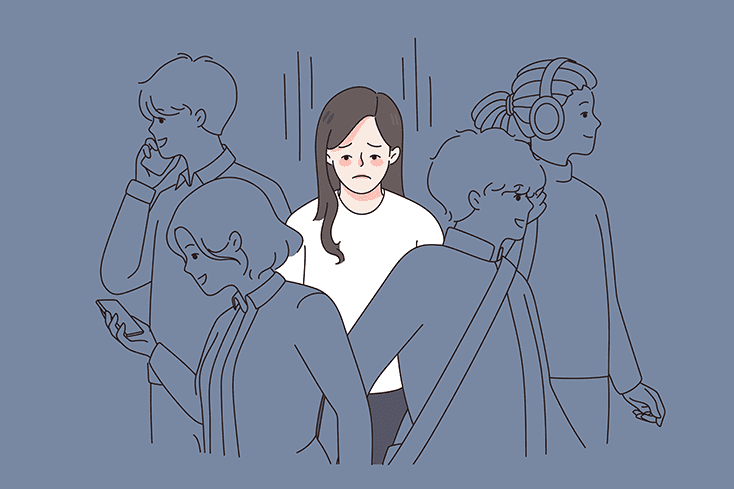April 01, 2022
By Heather Loeb

It happens to me a lot when I talk about my depression. Someone will suggest that I “be grateful” for the wonderful life I have. By acknowledging the many positives in my life and by expressing gratitude, they reason, I won’t be “so depressed.”
I fully acknowledge that I have an amazing life, and I’ve always had what I needed. But having my basic needs met — and even having wonderful things and people around me — does not “solve” my major depressive disorder, anxiety and personality disorder. Frankly, when dealing with the challenges of mental illness, it can be difficult to feel and express gratitude.
This increasingly common notion that a good mindset overpowers a mental health condition is a biproduct of an increasingly toxic positivity movement. “Good vibes only” is a catchy phrase, but it fails to consider the painful and even dangerous reality of depressive episodes. This type of “positivity only” thinking can aid in ignoring your problems and hiding uncomfortable emotions.
A Balance of Being Optimistic and Realistic
Managing multiple mental health conditions while trying to live a full life can be an emotional, physical and logistical challenge. I fight hard every day to get out of bed, take care of my kids, manage the household, write for a newspaper, run my blog and volunteer for NAMI Greater Corpus Christi. Some days are more of a battle than others, and I can never simply “forget” about my depression — or how it affects my life and my family’s lives.
Despite these challenges, I do count my blessings every single day. But I realize that having a positive attitude, while helpful, is not a cure. No matter how positively I think, I will continue to experience a chemical imbalance and symptoms that are not cured with willpower. Optimism and hope are important — but being realistic about my challenges and limitations is important, too.
Moreover, not feeling gratitude when you’ve been instructed to “be positive” can lead to feelings of guilt and shame, ultimately making a depressive episode even worse. When someone is struggling with a severe depressive episode, they should be focused on their self-care and survival — not feelings of shame and inadequacy.
The Truth about Gratitude
New evidence suggests that the positivity mindset may not be as effective as we once thought. In 2020, Ohio State University released an analysis of 27 studies on gratitude in which they examined whether the practice actually reduced symptoms of depression. Ultimately, they found that impact of gratitude interventions on depression is more limited than past research suggested.
Their conclusion resonated with me. When you’re in the throes of mental illness, like a depressive episode, it changes you — you lose interest in your hobbies, you isolate from family and friends, you can’t always practice good hygiene. Often, you’re so sad that you think you might break into a million pieces and attending to any responsibilities, like going to school or work, feels unsustainable. I understand why people aren’t always grateful. Perhaps the supposed “power of gratitude” doesn’t serve them at the time, and that’s ok.
Prioritizing Well-Being
If you’re struggling with your mental health, don’t allow well-intentioned but uneducated comments to convince you that you’re ungrateful — and, even if you’re not feeling grateful, do not allow the opinion of others to influence your view of yourself. Millions of people in the U.S. live with major depression (and other mental health conditions), yet mental illness is still shrouded in stigma and misinformation. What we need is a cultural shift from toxic positivity to education and compassion. Shaming those who are struggling breeds more negative emotions — and we don’t need to compound our struggles.
You can be both depressed and grateful — and don’t let anyone convince you otherwise — but you’re entitled to days where you don’t feel grateful at all.
Sometimes, you will have days where counting your blessings feels impossible. This does not make you a bad person; it means you’re busy fighting to live your life. Not everyone sees this battle you wage in your body and mind. But I see you. There is a community that sees you. Keep fighting. Keep counting your blessings if it helps — and don’t count them if it doesn’t. The only thing you need to do is take care of you to the best of your ability, whatever that may be.
Heather Loeb is the creator of Unruly Neurons, a blog dedicated to eradicating the stigma of mental illness. Heather has lived with major depressive disorder, generalized anxiety disorder, avoidant personality disorder and binge eating disorder for the past 20 years. She also writes a mental health column in the Corpus Christi Caller-Times. She lives in Corpus Christi with her husband, two children, four cats and a lizard.
Submit To The NAMI Blog
We’re always accepting submissions to the NAMI Blog! We feature the latest research, stories of recovery, ways to end stigma and strategies for living well with mental illness. Most importantly: We feature your voices.
LEARN MORE